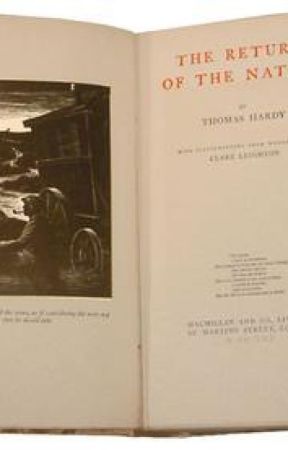The room had been arranged with a view to the dancing, the large oak table having been moved back till it stood as a breastwork to the fireplace. At each end, behind, and in the chimney-corner were grouped the guests, many of them being warm-faced and panting, among whom Eustacia cursorily recognized some well-to-do persons from beyond the heath. Thomasin, as she had expected, was not visible, and Eustacia recollected that a light had shone from an upper window when they were outside—the window, probably, of Thomasin's room. A nose, chin, hands, knees, and toes projected from the seat within the chimney opening, which members she found to unite in the person of Grandfer Cantle, Mrs. Yeobright's occasional assistant in the garden, and therefore one of the invited. The smoke went up from an Etna of peat in front of him, played round the notches of the chimney-crook, struck against the salt-box, and got lost among the flitches.
Another part of the room soon riveted her gaze. At the other side of the chimney stood the settle, which is the necessary supplement to a fire so open that nothing less than a strong breeze will carry up the smoke. It is, to the hearths of old-fashioned cavernous fireplaces, what the east belt of trees is to the exposed country estate, or the north wall to the garden. Outside the settle candles gutter, locks of hair wave, young women shiver, and old men sneeze. Inside is Paradise. Not a symptom of a draught disturbs the air; the sitters' backs are as warm as their faces, and songs and old tales are drawn from the occupants by the comfortable heat, like fruit from melon plants in a frame.
It was, however, not with those who sat in the settle that Eustacia was concerned. A face showed itself with marked distinctness against the dark-tanned wood of the upper part. The owner, who was leaning against the settle's outer end, was Clement Yeobright, or Clym, as he was called here; she knew it could be nobody else. The spectacle constituted an area of two feet in Rembrandt's intensest manner. A strange power in the lounger's appearance lay in the fact that, though his whole figure was visible, the observer's eye was only aware of his face.
To one of middle age the countenance was that of a young man, though a youth might hardly have seen any necessity for the term of immaturity. But it was really one of those faces which convey less the idea of so many years as its age than of so much experience as its store. The number of their years may have adequately summed up Jared, Mahalaleel, and the rest of the antediluvians, but the age of a modern man is to be measured by the intensity of his history.
The face was well shaped, even excellently. But the mind within was beginning to use it as a mere waste tablet whereon to trace its idiosyncrasies as they developed themselves. The beauty here visible would in no long time be ruthlessly over-run by its parasite, thought, which might just as well have fed upon a plainer exterior where there was nothing it could harm. Had Heaven preserved Yeobright from a wearing habit of meditation, people would have said, "A handsome man." Had his brain unfolded under sharper contours they would have said, "A thoughtful man." But an inner strenuousness was preying upon an outer symmetry, and they rated his look as singular.
Hence people who began by beholding him ended by perusing him. His countenance was overlaid with legible meanings. Without being thought-worn he yet had certain marks derived from a perception of his surroundings, such as are not unfrequently found on men at the end of the four or five years of endeavour which follow the close of placid pupilage. He already showed that thought is a disease of flesh, and indirectly bore evidence that ideal physical beauty is incompatible with emotional development and a full recognition of the coil of things. Mental luminousness must be fed with the oil of life, even though there is already a physical need for it; and the pitiful sight of two demands on one supply was just showing itself here.
When standing before certain men the philosopher regrets that thinkers are but perishable tissue, the artist that perishable tissue has to think. Thus to deplore, each from his point of view, the mutually destructive interdependence of spirit and flesh would have been instinctive with these in critically observing Yeobright.

YOU ARE READING
The Return of the Native (Completed)
ClassicsThe Return of the Native is Thomas Hardy's sixth published novel. It first appeared in the magazine Belgravia, a publication known for its sensationalism, and was presented in twelve monthly installments from January to December 1878. Because of the...
